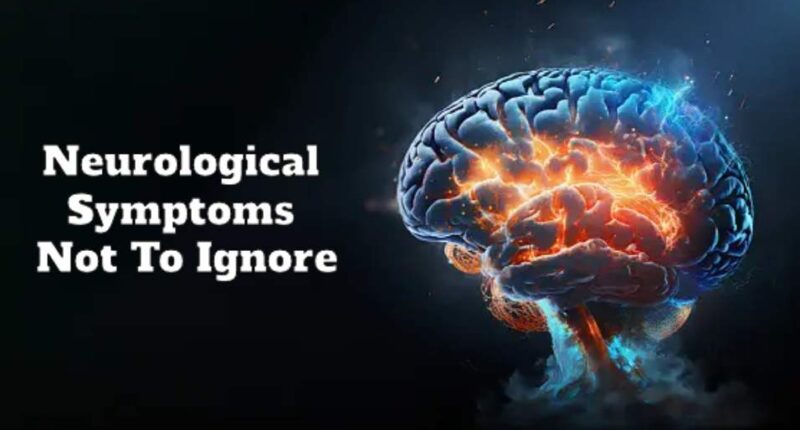It is important to be aware of the body’s signals to stay healthy. The signs and symptoms can be an indication of more serious problems, most of them, associated with your nervous system.
In this article, we will take a close look at five important symptoms of neurological disorders you should pay attention to and never ignore.
What Are Neurological Symptoms?
Neurological symptoms harm your nervous system which involves your brain, spinal cord, and nerves.
A person can feel the impact in different ways, from headaches to numbness in any body part.
5 Common neurological symptoms not to ignore:
1. Headaches:
Headaches are usually attributed to everyday inconveniences that people can get used to, but they can signal underlying and serious concerns, especially when they become chronic or severe. undefined
a) Potential Indicators of Serious Conditions:
Not always, the headache is a dangerous one. But brain tumors or even bleeding in the brain may be the reasons behind the headache that is persistent or severe.
By helping people to perceive these headaches sooner they can get the proper diagnosis and treatment for life-threatening diseases.
b) Impact on Daily Life:
Headaches that draw away us from our daily activities, work, or sleep may be ignored. Instead, headaches should be taken into consideration.
They can cause a marked loss in quality of life as well as lowered productivity, therefore, their causes need urgent attention.
c) Warning Signs of Stroke:
Abrupt and massive headaches, especially when extended by other symptoms such as weakness, numbness, and vision changes, often signal a possible stroke.
Timely and prompt medical assistance is necessary to thwart the development of additional problems.
d) Quality of Life:
Long-term head pain can be a big contributing factor to your general wellness, bringing in additional feelings of strain, anxiousness, and quality of living in general.
Overcoming the central neurological concerns that give rise to headaches could be done so you feel happier and healthier overall.
2. Numbness or Weakness:
Numbness or weakness is often associated with major neurological problems. They should be pointed out. Here’s why:
a) Potential Signs of Stroke:
A very common symptom of stroke is sudden numbness or weakness, especially on one side of the body.
Underestimating these symptoms will possibly procrastinate lifesaving medical treatment, which could result in further complications.
b) Indicator of Nerve Damage:
This numbness or weakness may be a consequence of the nerve damage that is associated with multiple sclerosis or peripheral neuropathy.
Highlighting these symptoms early on in treatment can reduce the risk of nerve damage and enhance the overall treatment outcomes.
c) Impact on Mobility and Function:
Numbness and weakness are going to affect your mobility a lot and the performance of your daily routines. Neglected early symptoms can lead to a lack of autonomy and decrease the quality of life.
d) Underlying Health Conditions:
The patient may also experience numbness or weakness which can signify disorders of the spinal cord, diabetes, or autoimmune diseases.
Detecting and treating these diseases timely will protect you from complications and improve the prognosis.
3. Seizures:
The unruly electrical abnormalities in the brain can result in seizures, which are a symptom of epilepsy or other neurological infections. Here’s why they should never be ignored:
a) Potential Signs of Epilepsy:
The frequency of seizures is an elementary feature of epilepsy, a condition that represents a group of neurological disorders caused by abnormal brain activity.
Failing to adhere to antiepileptic drugs could mean foregoing early-onset treatment for the condition and increasing the possibility of the emergence of disease-related complications.
b) Risk of Injury:
The seizure may bring on loss of consciousness and convulsions, which may result in the risk of falls and injuries.
Carelessness regarding seizures can be detrimental and result in accidents and physical injuries that may happen when they occur unexpectedly.
c) Indicator of Brain Abnormalities:
Epilepsies frequently demonstrate seizures which could be a part of the various brain abnormalities such as tumors, infections, or traumatic brain injuries.
Prompt medical evaluation often enables the treatment provider to detect the root problem and stop the abscess or infection from progressing.
d) Impact on Quality of Life:
Epileptic seizures can negatively impact a patient’s Quality of Life, leading to the fact that the individual cannot work drive, and engage in daily activities.
Developing a planning avoidance coping mechanism to challenge seizures will intensify the situation and shatter one’s well-being.
e) Potential for Status Epilepticus:
Disregarding seizures results in the threat of status epilepticus, a condition that could trap the person in a state of prolonged or recurrent seizures.
First-aid medical treatment should be provided as soon as possible, which is essential in not complicating things and for the safety of the patient.
4. Vision Changes:
Blurred vision, double vision, or lightning bolts in seeing may be the signs of optic neuritis or glaucoma. Here’s why these changes should never be ignored:
a) Indicator of Neurological Disorders:
Alterations in vision could be the first symptoms of neurological illnesses such as optic neuritis, glaucoma, and even stroke.
Using these early indicators instead of an approach of waiting for more serious problems to happen can delay diagnosis and treatment, letting the underlying condition become worse.
b) Impact on Daily Functioning:
Vision loss can bring along with itself quite a few issues in performing day-to-day tasks like reading, driving, or going around in the environment.
Not taking these modifications into account can put lives in danger and in case of a mishap or injury also patients may find it difficult to carry out their daily activities.
c) Potential for Permanent Damage:
Unfortunately, several neurological disorders adversely affect the eyes, including optic neuritis. If these disorders are left unchecked, permanent vision impairment can result.
If an individual gets their eyes examined immediately, the process of the healing can benefit the eye, therefore, no permanent health trouble is created.
d) Association with Other Symptoms:
Visual changes frequently don’t appear in isolation but resemble other neurological symptoms like headaches, dizziness, numbness, and so on.
Failing to convey this link may be when all these symptoms together communicate the presence of a neurological condition.
e) Psychological Impact:
Vision is everyone’s sense that can be compared to all the organs of people, which can be the reason for the emotional shocks, which may lead to a depression or decrease in the quality of people’s lives.
These changes can further worsen mental health and impede complete wellness when not paid attention.
5. Dizziness or Loss of Balance:
Dizzyness or loss of Balance should not be neglected as a Neurological Symptom with many reasons in its favor.
For example, these symptoms could point to inner ear problems or more complicated conditions that affect the nervous system (for example, multiple sclerosis).
This can bring about more complex issues and falls, based on age. As an example, falls are often the cause of an increase in complications among older adults.
This is the second inclination, impaired balance or sudden intolerance may interfere with everyday routine activities which may adversely impact the person’s level of independence and quality of life.
Last of all, such symptoms may on the one side be the signs of the hidden more severe psychiatric problems, like strokes or brain tumors.
Consequently, a prompt medical evaluation by a professional, undertaken to diagnose and treat effectively, this type of condition early on should be sought to avoid any possible complications or adverse consequences.
When to See a specialist?
Failing to Address Neurological Symptoms Will Invite Major Problems. If you have such experiences, you need help immediately.
As early intervention can help to effectively cure the problem and prevent it from getting worse, we should try our best to diagnose it as early as possible.
Conclusion:
Your body conveys its internal status to you through various signs, and neurological symptoms deserve to be mentioned.
Doing so will help you establish a preventive method as early as possible and allow you to maintain good neurological health and well-being.
Make sure to never ignore signs related to the brain, it may be a question of life and death.










